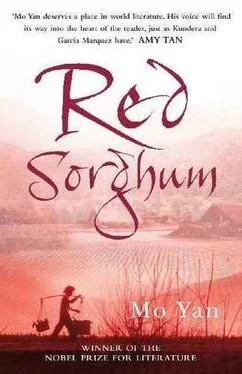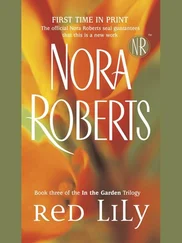It poured rain on the seventh night of the seventh month, complete with thunder and lightning. Grandma handed Father, who was nearly four months old, to Passion and followed Granddad into the shop in the eastern compound, where they closed the doors and windows and had Uncle Arhat light the lamp. Grandma laid out seven copper coins on the counter in the shape of a plum blossom. Granddad swaggered back and forth beyond the counter, then spun around, drew his pistols, and began firing — pow pow, pow pow, pow pow pow — seven rapid shots. The coins flew up against the wall; three bullets fell to the floor, the other four were stuck in the wall.
Grandma and Granddad walked up to the counter, where they held up the lantern and saw there wasn’t a mark on the surface.
He had perfected his ‘seven-plum-blossom skill’.
Granddad rode the black mule up to the wine shop on the eastern edge of the village. Cobwebs dotted the frame of the door, which he pushed open and walked inside. A strong smell of putrefaction made his head reel. Covering his nose with his sleeve, he looked around. The fat old man was sitting beneath the beam, a noose around his neck. His eyes were open; his black tongue was sticking out through parted lips.
Granddad spat twice to clear out his mouth and led the mule to the edge of the village where he stood thoughtfully for a long time, while the mule pawed the ground and swished its hairless tail to drive away swarms of black flies as big as beans. Finally, he mounted the mule, which stretched out its neck and began heading home; but Granddad jerked back the icy metal bit in its mouth and smacked it on the rump, turning down the path by the sorghum field.
The little wooden bridge over the Black Water River was still intact at the time, and whitecaps from the swollen river splashed up onto the bridge planks. The roar of the river frightened the mule, which balked at the bridgehead and refused to cross, even when Granddad showed it his fists. So he rose up in the saddle and sat down hard, forcing the mule to trot out into the middle of the bridge, its back sagging. He reined it to a halt. A shallow layer of clear water washed across the planks, and a red-tailed carp as thick as a man’s arm leaped out of the water west of the bridge, describing a rainbow in the air before splashing into the water on the eastern side.
Granddad watched the westward flow of water as it washed the mule’s hooves clean. The mule lowered its lips to touch the spray above the churning water, which splashed its long, narrow face. It closed its nostrils and bared its white, even teeth.
Green-tipped sorghum on the southern bank waved in the wind as Granddad rode eastward along the riverbank. When the sun was directly overhead, he dismounted and led the animal into the sorghum field. The black, rain-soaked earth was like a gooey paste that swallowed up the mule’s hooves and covered Granddad’s feet. The mule struggled to keep its heavy body moving forward. White puffs of air and green, powdery froth shot from the animal’s nostrils. The pungent, vinegary smell of sweat and the putrid stench of black mud made Granddad feel like sneezing. He and his mule parted the dense, tender green sorghum to clear a lane through the field; but the stalks righted themselves slowly, leaving no sign that anyone had passed by. Water seeped from the ground where they had walked, quickly filling the indentations.
Granddad’s legs and the mule’s belly were splattered with mud. The sound of their movement was harsh and grating in the stifling air of the field, where the sorghum grew unchecked. Before long, Granddad was breathing hard; his throat was parched, his tongue sticky and foul-tasting. Having no more perspiration to sweat, his pores oozed a sticky liquid like pine oil, which stung his skin. The sharp sorghum leaves cut his bare neck.
The angered mule kept shaking his head, wanting desperately to leap into the air and gallop along the tips of the sorghum, or, like our other black mule, to be at the trough feeding wearily on a mixture of sorghum leaves and scorched grain.
Granddad walked confidently and steadfastly down a furrow, his plan well thought out. The mule, whose eyes were watering from brushing up against sorghum leaves, kept looking at its master, sometimes sadly, sometimes angrily, as it was led through the field. Fresh footprints appeared on the ground in front of them, and Granddad detected traces of the smell he had been anticipating. The mule shortened the distance between them, still snorting, still weaving its bulky body among the sorghum stalks. Granddad coughed, more loudly than necessary, and a wave of intoxicating fragrance wafted towards him from up ahead. He knew, his sixth sense told him, that he was a mere step or two from the spot that had obsessed him for so long.
Granddad followed the trail without having to look at the footprints. He sang out to break the stillness: ‘. . One horse far away from the state of Xiliang…’
He sensed footsteps behind him, but kept walking, as though blissfully ignorant. Suddenly a hard object poked him in the ribs. He raised his hands compliantly. Hands reached into his shirt and removed his pistols. A strip of black cloth was wrapped around his eyes.
‘I want to see your chief,’ he said.
A bandit wrapped his arms around Granddad, picked him up off the ground, and spun him around for a minute or two, then let him fall hard onto the spongy black ground. His forehead and hands covered with mud, he climbed to his feet by grabbing on to a stalk of sorghum; his ears were ringing and he saw a flash of green, then a flash of black. He could hear the heaving breathing of the man beside him. The bandit broke off a stalk of sorghum and thrust one end into Granddad’s hand. ‘Let’s go!’ he said.
Granddad heard the footsteps of the bandits behind him and a sucking sound as the mule pulled its hooves out of the gooey mud. When the bandit removed Granddad’s blindfold, he covered his eyes with his hands, squeezed out a dozen or so tears, then let his hands drop. In front of him was a camp trampled out of the sorghum. A dozen men with rain capes over their shoulders stood in front of the two tents, where a man sat on a wooden stump; there was a big spot on his neck.
‘Where’s your leader?’
‘Are you the proprietor of the distillery?’ Spotted Neck asked him.
‘Yes.’
‘What do you want here?’
‘To pay my respects to an expert and learn from him.’
Spotted Neck sneered. ‘Don’t you go down to the river to shoot fish for target practice every day?’
‘I can’t get the knack of it.’
Spotted Neck held up Granddad’s pistols and looked down the barrels, then cocked them. ‘Fine weapons. What are you practising with these for?’
‘To use on Nine Dreams Cao.’
‘Isn’t he your old lady’s foster-dad?’
‘He gave me three hundred and fifty lashes with the sole of his shoe! All because of you.’
Spotted Neck laughed. ‘You murdered two men and took possession of their woman. You deserve to have your head lopped off.’
‘He gave me three hundred and fifty lashes!’
Spotted Neck raised his right hand and pulled off three quick shots — pow pow pow — then did the same with his left. Granddad sat down hard on the ground, buried his head in his arms, and screeched. The bandits roared with laughter.
‘How could a scared rabbit like that murder anyone?’ Spotted Neck wondered aloud.
‘He saves his courage for sex,’ one of the bandits said.
‘Go home and take care of business,’ Spotted Neck said. ‘Now that the Gook is dead, your home will be the contact point.’
‘I want to learn how to shoot so I can kill Nine Dreams Cao!’ Granddad repeated.
‘I hold the life of Nine Dreams Cao in the palm of my hand, and I can take it from him any time I want,’ Spotted Neck said.
Читать дальше












